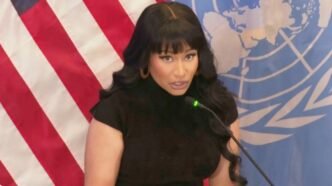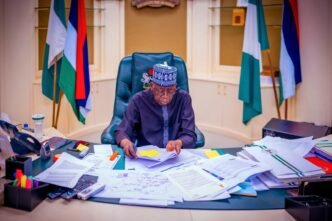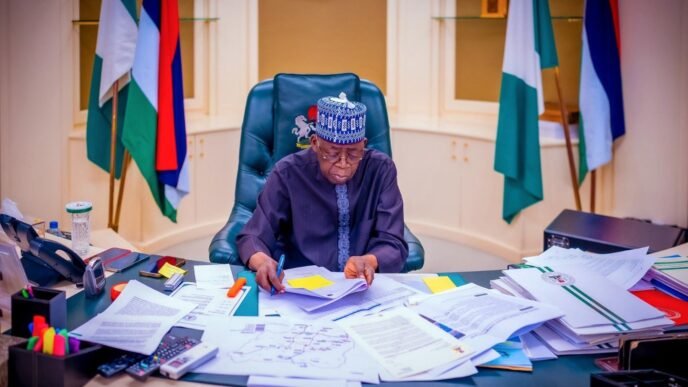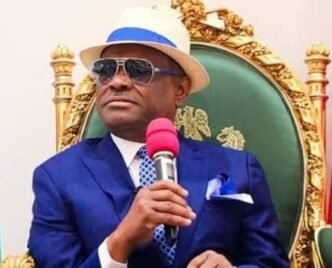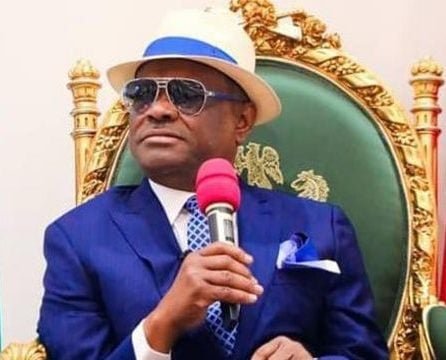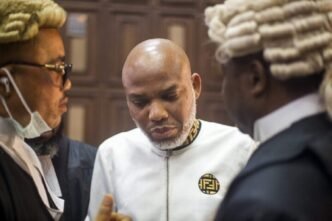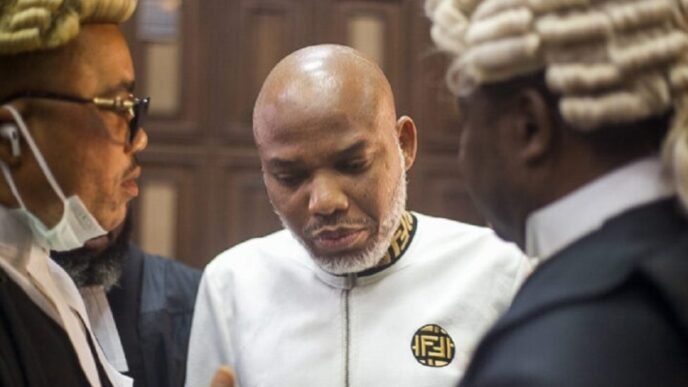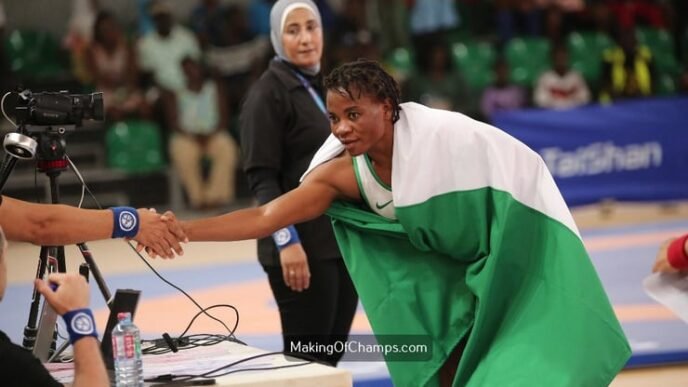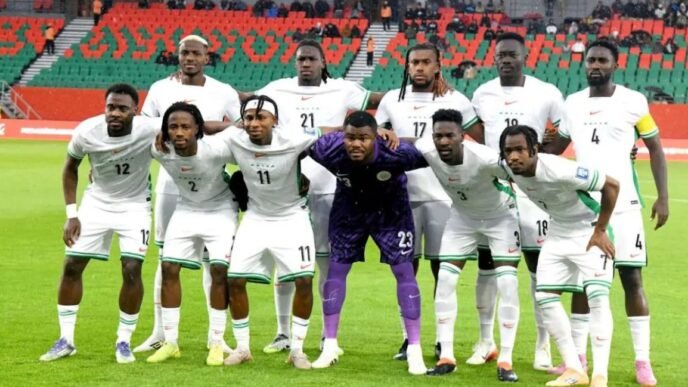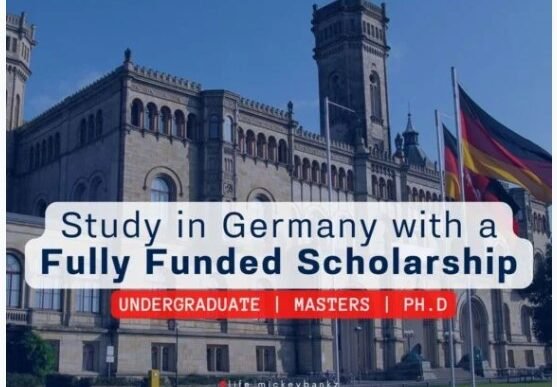In a powerful and unprecedented appeal at the United Nations on Tuesday evening, U.S. Ambassador to the UN Michael Waltz and internationally renowned rapper Nicki Minaj jointly raised the alarm about the escalating security crisis facing Christian communities in Nigeria. Speaking at a high-level event titled “Combatting Religious Violence and the Killing of Christians in Nigeria,” both figures linked the recent wave of attacks to deepening threats against religious freedom in the country.
For Ambassador Waltz, the violence is not isolated — it represents a systematic erosion of Christian existence in Nigeria. He described the killings as “genocide wearing the mask of chaos,” calling on the international community to treat them as more than random acts of violence. Minaj, for her part, used her global platform to amplify the suffering of Christians in Nigeria, urging urgent action to safeguard their right to worship in peace.
A Chilling Diagnosis: Waltz’s Wake-Up Call
Ambassador Waltz’s speech was blunt and somber. He insisted that the killings are not just criminal incidents or the by-products of weak security, but part of a much graver phenomenon. In his words, what appears as chaos is, in fact, a targeted campaign:
“There is a body of evidence … that paints a very grim picture of disproportionate suffering among Christians … where … families are torn apart, clergy is repeatedly assassinated, and entire congregations … are being erased … One bullet at a time, one torched Bible at a time.”
By framing the bloodshed as “genocide,” Waltz sought to elevate the issue to the highest moral and diplomatic urgency. He stressed that this is not simply about crime — it’s about identity, faith, and the very survival of a community.
Minaj’s Moral Outcry: Faith Under Fire
Nicki Minaj’s appearance at a UN event was unexpected, but far from superficial. She spoke from the heart, blending her influence as an artist with deep concern for human rights and religious liberty.
Minaj thanked former U.S. President Donald Trump for shining a spotlight on the topic — crediting his “leadership on the global stage” for bringing attention to the plight of Nigerian Christians. She described the situation in stark terms:
- Targeted violence: Christians being driven from their homes, attacked, and killed
- Destruction of worship: Churches burned, places of prayer desecrated
- Communities torn apart: Families living in constant fear simply because of their faith
She challenged listeners to recognize that the issue transcends partisan politics: “Protecting Christians in Nigeria is not about taking sides or dividing people. It is about uniting humanity.” She went further: for her, standing against religious violence isn’t a new cause — it’s part of her life’s mission.
As a global artist, she drew parallels between her personal journey and the struggle of persecuted believers: “Music has taken me around the globe. I have seen how people … come alive when they hear a song that touches their soul … Religious freedom means we all sing our faith … regardless of who we are, where we live and what we believe.” Her message was a plea for empathy, unity, and urgent international solidarity.
The Political Undercurrents
While the event was framed around religious freedom, it also carried heavy political symbolism. Minaj’s gratitude toward Donald Trump, juxtaposed with Waltz’s forceful rhetoric, signaled a broader strategy — one that ties religious advocacy to diplomatic pressure.
Critics argue that such a framing could complicate Nigeria’s sovereignty, especially in light of previous threats from U.S. quarters that appear to hint at more forceful engagement. The narrative of genocide and existential threat is a serious one; it raises difficult questions about foreign intervention, international pressure, and the balance between advocacy and national self-determination.
Some observers say that linking Christian suffering in Nigeria to global geopolitics risks oversimplifying complex security challenges. Others, however, view the intervention as a welcome moral spotlight, calling for renewed international resolve to protect vulnerable communities.
The Reality on the Ground: A Broader Crisis
To fully understand the weight of Waltz and Minaj’s warnings, one must grapple with the multifaceted nature of violence in Nigeria. The country faces a complex security landscape:
- Insurgency: Islamist militant groups remain active in parts of northern Nigeria, contributing to deadly clashes.
- Banditry and kidnappings: Armed criminal networks regularly raid rural communities, demanding ransoms and terrorizing civilians.
- Communal tensions: Longstanding ethnic, land, and resource disputes often fuel violence that cuts across religious lines.
- Weak governance in remote areas: In border communities, limited infrastructure and poorly resourced security agencies leave many residents vulnerable.
While Christian communities have certainly borne significant losses, analysts warn against viewing the violence solely through a religious lens. For many, the conflict is not about faith, but about poverty, marginalization, and competition for land and resources. Others overlap faith-based framing with criminal motives, making it difficult to draw neat lines.
Against this backdrop, the challenge is clear: how to distinguish between faith-motivated persecution and broader systemic violence — and then how to mount an effective, principled international response.
Why the UN Stage Matters
Holding this conversation at the United Nations gave the issue a level of global legitimacy and urgency. The UN is not just a diplomatic venue — it is a moral forum. By bringing attention to the suffering of Nigerian Christians at such a high level, the event aimed to galvanize multilateral engagement, calls for accountability, and renewed global vigilance.
Waltz’s and Minaj’s joint appearance reflects a strategic blend of diplomacy and celebrity advocacy — a modern model of influence that aims to turn headlines into action. Their message was not just for Nigeria, but for the international community: to recognize religious persecution as a human rights priority, not a peripheral issue.
Reactions: Echoes Around the Globe
The event has sparked a range of reactions, both positive and critical.
Supporters have praised Waltz and Minaj for raising the profile of a deeply underreported crisis. Many faith-based organizations and human-rights advocates say the UN event could lead to more pressure on governments — including Nigeria’s — to protect religious minorities.
Skeptics, meanwhile, warn of potential risks. Some question the sincerity and neutrality of the framing. They argue that labeling what is happening in Nigeria as “genocide” could fuel polarization, feed into interventionist rhetoric, or be used as a political lever by outside powers. Others worry that it overshadows other victims of violence who may not fit neatly into a faith-based narrative.
Nigerian political observers are likely to watch closely. The government may reject claims of faith-targeted genocide, instead emphasizing that insecurity is a wider national issue. There is also a risk that external criticism could be viewed as meddling — particularly if framed in terms of intervention.
What Could Come Next?
Ambassador Waltz’s and Minaj’s call to action raises important questions about what concrete steps the international community might take — and how Nigeria could respond.
Some of the possible paths forward include:
- Increased diplomatic pressure: United Nations bodies or Western governments might push for stronger protections, investigations, or sanctions.
- Aid and development programs: International donors could tie funding to protections for religious minorities, invests in community resilience, or support restorative justice.
- Multilateral fact-finding: A UN-led investigation could help establish the scale and nature of faith-based violence in Nigeria, potentially influencing international policy.
- Civil society strengthening: Faith groups, local NGOs, and international partners could deepen their collaboration on early warning, protection, and conflict resolution.
- Policy reforms: The Nigerian government could respond by reinforcing its security architecture, improving rural governance, and strengthening protections for religious minorities — if it chooses to engage with the criticisms seriously.
But the road ahead will not be easy. The complexity of violence in Nigeria means that any response must be sophisticated, long-term, and rooted in local realities. Overly simplistic labels may energize advocates, but real change will require sustained political will, cross-border cooperation, and genuine commitment to justice.
The Power of Symbolic Moments
Beyond policy, the UN event demonstrates how symbolic gestures can catalyze conversation. When a high-profile artist like Nicki Minaj stands alongside a diplomat like Michael Waltz, their combined platform reaches far beyond the traditional halls of power. It brings media attention, raises awareness among younger audiences, and reframes suffering in moral terms.
This moment is more than a speech — it is a claim: that religious violence cannot be ignored, and that the world has a responsibility to stand with communities facing persecution. Whether that claim translates into real-world protection remains to be seen.
Conclusion: An Urgent Call, With Stakes That Matter
At its core, Tuesday’s UN event was a blunt moral appeal — from diplomat to citizen, from global icon to policymaker. Waltz’s warning of “genocide wearing the mask of chaos” and Minaj’s emotionally charged testament together called for more than sympathy. They demanded action.
For Nigeria, the spotlight on Christian communities offers new pressure and a reminder that its security crisis has international dimensions. For the international community, the event raises a stark choice: to treat religious violence as a peripheral issue, or to elevate it into a human rights priority.
The next step, then, is not just about words — it is about what follows: sustained diplomatic pressure, meaningful reform, and protection for those living under threat. There is no certainty that the UN event will deliver immediate outcomes, but it has undeniably widened the conversation.
The violence in Nigeria, whether viewed through the prism of religion, security, or human rights, demands more than rhetoric. And as Waltz and Minaj implored the world, the cost of ignoring it may be far greater than many realize.

